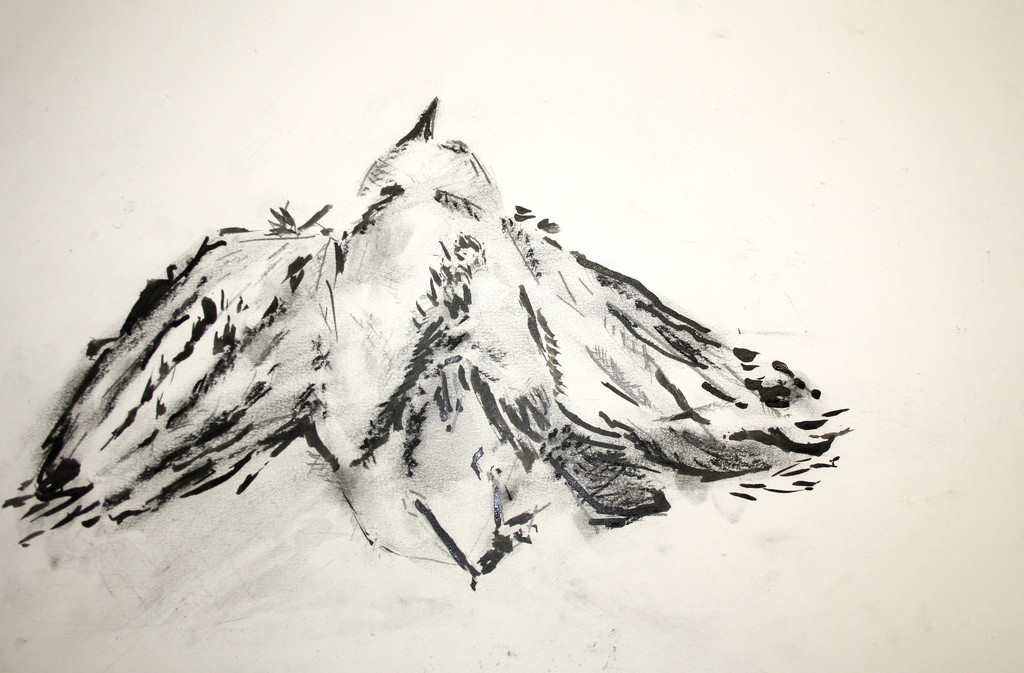Photo by Sophia.
I’ve been having an insightful shuffle through Mihaly Csikszentmihalyi’s book Creativity: The Work and Lives of 91 Eminent People. Mihaly is a seminal professor of Psychology and Management, and is the Founding Co-Director of the Quality of Life Research Center at Claremont. He writes:
“I have devoted 30 years of research to how creative people live and work, to make more understandable the mysterious process by which they come up with new ideas and new things. If I had to express in one word what makes their personalities different from others, it’s complexity. They show tendencies of thought and action that in most people are segregated. They contain contradictory extremes; instead of being an individual, each of them is a multitude.”
Nine out of the ten people in me strongly agree with that statement. As someone paid to be creative, I sometimes feel kaleidoscopic in my views or opinions, and that “multitude” of expressions sometimes confuses those around me. Why does that happen? My thoughts make cohesive sense to me, yet others sometimes feel that I am contradicting myself or switching positions. What is wrong with me?
Mihaly describes 9 contradictory traits that are frequently present in creative people:
01
Most creative people have a great deal of physical energy, but are often quiet and at rest. They can work long hours at great concentration.
02
Most creative people tend to be smart and naive at the same time. “It involves fluency, or the ability to generate a great quantity of ideas; flexibility, or the ability to switch from one perspective to another; and originality in picking unusual associations of ideas. These are the dimensions of thinking that most creativity tests measure, and that most creativity workshops try to enhance.”
03
Most creative people combine both playfulness and productivity, which can sometimes mean both responsibility and irresponsibility. “Despite the carefree air that many creative people affect, most of them work late into the night and persist when less driven individuals would not.” Usually this perseverance occurs at the expense of other responsibilities, or other people.
04
Most creative people alternate fluently between imagination and fantasy, and a rooted sense of reality. In both art and science, movement forward involves a leap of imagination, a leap into a world that is different from our present. Interestingly, this visionary imagination works in conjunction with a hyperawareness of reality. Attention to real details allows a creative person to imagine ways to improve them.
05
Most creative people tend to be both introverted and extroverted. Many people tend toward one extreme or the other, but highly creative people are a balance of both simultaneously.
06
Most creative people are genuinely humble and display a strong sense of pride at the same time.
07
Most creative people are both rebellious and conservative. “It is impossible to be creative without having first internalized an area of culture. So it’s difficult to see how a person can be creative without being both traditional and conservative and at the same time rebellious and iconoclastic.”
08
Most creative people are very passionate about their work, but remain extremely objective about it as well. They are able to admit when something they have made is not very good.
09
Most creative people’s openness and sensitivity exposes them to a large amount of suffering and pain, but joy and life in the midst of that suffering. “Perhaps the most important quality, the one that is most consistently present in all creative individuals, is the ability to enjoy the process of creation for its own sake. Without this trait, poets would give up striving for perfection and would write commercial jingles, economists would work for banks where they would earn at least twice as much as they do at universities, and physicists would stop doing basic research and join industrial laboratories where the conditions are better and the expectations more predictable.”
Sometimes what appears to be a contradiction on the surface is actually a harmony in disguise. My problem has been primarily one of communication. I am learning to let people know what I am thinking and why, and explaining myself in a way that helps them understand why I am discussing multiple perspectives instead of just cleanly stating my own. At first it might not make sense, but give me/us long enough, and it will.


Many years ago, in the hey-day of creativity research (J.P. Guilford, E. Paul Torrance, Sidney Parnes…) one of the primary definitions of the creative personality was “Preference for complexity.” And creativity was viewed by many of the cutting edge researchers (Barron at Cal, for example) as a personality trait. After the cognitive traits, learned skills, and processes, there was that undefinable essence (“Individual Reaching Out” in Journal of Creative Behavior, First Quarter, 1976, 45) that could not be quantified, but clearly exists.
What a fantastic read, and there is a lot of truth behind it. It feels peculiar to have so many continuous, conflicting thoughts. One might often wonder how to deal with the consequences of having a creative mind. As you said, letting others know what you’re thinking is a great step. I also believe that discussion with like-minded people is an extraordinarily valuable activity that can help bring order to the chaos.
Next you should research and write about how haters are one-dimensional thinkers. Haters believe they automatically know the answers to everything, instantly. Haters forgot believe that everyone thinks like they do and can be just like they are, if only everyone else weren’t so busy faking it, just to appear different. Haters just know how life should be lived and won’t hesitate to course-correct those who deviate, through insults, condescension or name-calling — because that’s how you get people to wake up and stop living life the wrong way!
Paradox. The center of all creation is paradox. If you cannot handle it, don’t complain about those who can. Living with and in paradox is wise and empowering and creative.
We’re open 24 hours a day and 7 days per week.
An old design tutor once told me that creatives are a ‘jack of all trades, but master of none’… and after quiet a few years working for very different clients I now realise what he means… we learn just enough about our clients world to make our work relevant, but then we don’t stay around long enough to get fully sucked in as this can kill our creativity… nice article and very true from my perspective…
His psychologist analysis is a somewhat accurate way to describe an “over-active” mind. Most highly creative people are ADHD, whether they know it or not. Look up “Ring of Fire ADHD, and the brain scans associated with it. I’ve had those scans, and instead of 2 or 3 marble sized areas lighting up in my brain, there are 16-20. Which might illuminate the conjecture that there are “10 people in there”. Its not a matter of being schizophrenic, but rather having a brain like a Lamborghini, on jet fuel, driving on a rollercoaster track while painting a portrait, telling yourself jokes, juggling with one hand and talking on the phone while calmly listening to Beethoven, who, by the way was ADHD.
ADHD “creative’s: Mozart, Bach, Beethhoven, Elvis, Albert Einstein
Galileo
Leonardo da Vinci
Cher
Michael Phelps
Charles Schwab
Henry Winkler
Danny Glover
Walt Disney
John Lennon
Greg Louganis
Winston Churchill
Henry Ford
Stephen Hawkings
Jules Verne
Alexander Graham Bell
Woodrow Wilson
Hans Christian Anderson
Nelson Rockefeller
Thomas Edison
Gen. George Patton
Agatha Christie
John F. Kennedy
Whoopi Goldberg
Rodin
Thomas Thoreau
David H. Murdock
Dustin Hoffman
Pete Rose
Russell White
Jason Kidd
Russell Varian
Robin Williams
Louis Pasteur
Werner von Braun
Dwight D. Eisenhower
Robert Kennedy
Prince Charles
Gen. Westmoreland
Eddie Rickenbacker
Gregory Boyington
Harry Belafonte
F. Scott Fitzgerald
Mariel Hemingway
Steve McQueen
George C. Scott
Tom Smothers
Suzanne Somers
Lindsay Wagner
George Bernard Shaw
Joan Rivers
Jim Carey
Carl Lewis
Jackie Stewart
“Magic” Johnson
John Corcoran
Sylvester Stallone
Maybe he should have just admitted most creative people are ADHD.
Pretty much defines creative people as a schizophrenic
This is like the horoscope. The statements are broad and vague, and they can apply to just anybody. I’m not creative at all, and yet can relate to each and every behaviors you are depicting. It’s the human experience, we try and balance ourselves between all these contradictions. I can read this to anybody around me and they would find a piece of themselves in there. So imho this is interesting and comforting for creative people who think this article can tell them something about themselves (and we all want to feel special!), but it’s on the ‘one-size fits all’ register. Creative people are surely special in their own way, but these statements really apply to all people who have enough comfort in their lives to self-analyze and introspect what they think makes them stand out in the crowd.